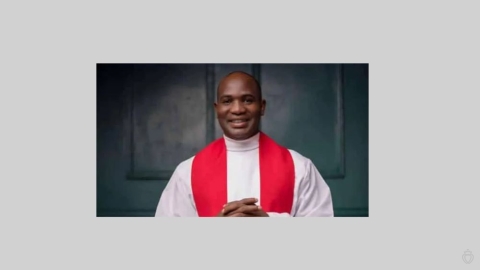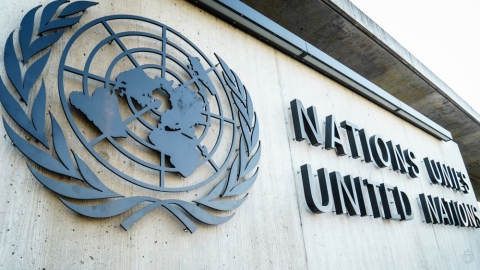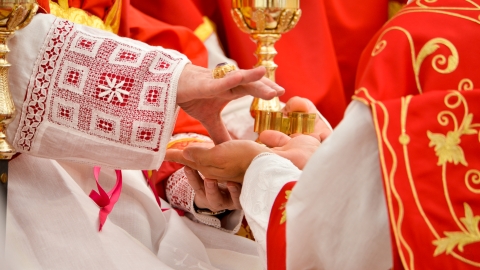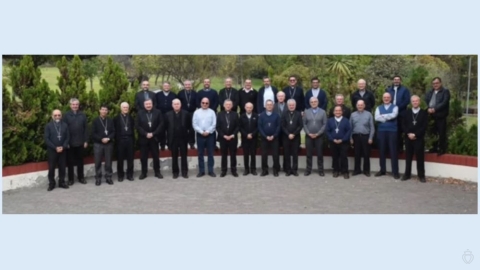What Does the Encyclical Humanae Vitae of Pope Paul VI Say?

Published on July 25, 1968, the encyclical Humanae Vitae by Pope Paul VI is about marriage, the regulation of birth, and the transmission of life.
The pope begins by recalling the Church’s competence on “the principles of the moral teaching on marriage—a teaching which is based on the natural law as illuminated and enriched by divine Revelation.” He then reaffirms her authority: “No member of the faithful could possibly deny that the Church is competent in her magisterium to interpret the natural moral law. It is in fact indisputable, as Our predecessors have many times declared, that Jesus Christ, when He communicated His divine power to Peter and the other Apostles and sent them to teach all nations His commandments, constituted them as the authentic guardians and interpreters of the whole moral law, not only, that is, of the law of the Gospel but also of the natural law. For the natural law, too, declares the will of God, and its faithful observance is necessary for men's eternal salvation. In carrying out this mandate, the Church has always issued appropriate documents on the nature of marriage, the correct use of conjugal rights, and the duties of spouses.”
This teaching includes a reminder of the ends of marriage: “Marriage and conjugal love are by their nature ordained toward the procreation and education of children.” The acts of the spouses are therefore to be understood as a part of “the objective moral order which was established by God, and of which a right conscience is the true interpreter. In a word, the exercise of responsible parenthood requires that husband and wife, keeping a right order of priorities, recognize their own duties toward God, themselves, their families and human society. From this it follows that they are not free to act as they choose in the service of transmitting life, as if it were wholly up to them to decide what is the right course to follow. On the contrary, they are bound to ensure that what they do corresponds to the will of God the Creator. The very nature of marriage and its use makes His will clear, while the constant teaching of the Church spells it out.”
Following the example of Pius XI, Paul VI insists on the relation between union and procreation: “The Church, nevertheless, in urging men to the observance of the precepts of the natural law, which it interprets by its constant doctrine, teaches that each and every marital act must of necessity retain its intrinsic relationship to the procreation of human life....The fundamental nature of the marriage act, while uniting husband and wife in the closest intimacy, also renders them capable of generating new life—and this as a result of laws written into the actual nature of man and of woman. And if each of these essential qualities, the unitive and the procreative, is preserved, the use of marriage fully retains its sense of true mutual love and its ordination to the supreme responsibility of parenthood to which man is called.”
The pope therefore exhorts the spouses to use marriage wisely: “To use this divine gift while depriving it, even if only partially, of its meaning and purpose, is equally repugnant to the nature of man and of woman, and is consequently in opposition to the plan of God and His holy will. But to experience the gift of married love while respecting the laws of conception is to acknowledge that one is not the master of the sources of life but rather the minister of the design established by the Creator.”
Consequently: “We are obliged once more to declare that the direct interruption of the generative process already begun and, above all, all direct abortion, even for therapeutic reasons, are to be absolutely excluded as lawful means of regulating the number of children. Equally to be condemned, as the magisterium of the Church has affirmed on many occasions, is direct sterilization, whether of the man or of the woman, whether permanent or temporary. Similarly excluded is any action which either before, at the moment of, or after sexual intercourse, is specifically intended to prevent procreation—whether as an end or as a means.”
Faced with the modern sophists who justify the use of contraceptionby arguing that it is a way of safeguarding the individual, familial, or social welfare, the pope recalls that “it is never lawful, even for the gravest reasons, to do evil that good may come of it”. Contraception is an intrinsic disorder: “sexual intercourse which is deliberately contraceptive and so intrinsically wrong” cannot be made right even by a whole married life of otherwise normal relations.
The papal encyclical also points an accusing finger at the disastrous effects of the methods of artificial birth control, in terms that are still as true as ever today: they “open wide the way for marital infidelity and a general lowering of moral standards. Not much experience is needed to be fully aware of human weakness and to understand that human beings—and especially the young, who are so exposed to temptation—need incentives to keep the moral law, and it is an evil thing to make it easy for them to break that law. Another effect that gives cause for alarm is that a man who grows accustomed to the use of contraceptive methods may forget the reverence due to a woman, and, disregarding her physical and emotional equilibrium, reduce her to being a mere instrument for the satisfaction of his own desires, no longer considering her as his partner whom he should surround with care and affection.”
The last part of Humanae Vitae is consecrated to Pastoral Directives. For the pope realizes that “the teaching of the Church regarding the proper regulation of birth is a promulgation of the law of God Himself. And yet there is no doubt that to many it will appear not merely difficult but even impossible to observe. Now it is true that like all good things which are outstanding for their nobility and for the benefits which they confer on men, so this law demands from individual men and women, from families and from human society, a resolute purpose and great endurance.”
Paul VI reminds all of their specific duties. He speaks of course of an honest and virtuous conjugal life, mastery of self, self-discipline with a certain asceticism and the practice of continence, purity, loving consideration between the spouses, etc. But he also recalls the duties of educators “and all those whose right and duty it is to provide for the common good of human society. We would call their attention to the need to create an atmosphere favorable to the growth of chastity so that true liberty may prevail over license and the norms of the moral law may be fully safeguarded.”
Concretely: “Everything therefore in the modern means of social communication which arouses men's baser passions and encourages low moral standards, as well as every obscenity in the written word and every form of indecency on the stage and screen, should be condemned publicly and unanimously by all those who have at heart the advance of civilization and the safeguarding of the outstanding values of the human spirit.”
It is therefore not surprising that the pope exhorts public authorities not to adopt immoral or arbitrary public policies. He begs them: “Never allow the morals of your peoples to be undermined. The family is the primary unit in the state; do not tolerate any legislation which would introduce into the family those practices which are opposed to the natural law of God.” This appeal to public authorities, that is also addressed to international organizations, is followed by encouragements to scientists and doctors, Christian spouses and families, priests and bishops. The bishops are bid never to diminish “the salutary doctrine of Christ” and to tirelessly safeguard “the holiness of marriage”. Man’s happiness is to be found in keeping “the laws which the Most High God has engraved in his very nature. These laws must be wisely and lovingly observed.”





